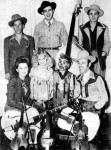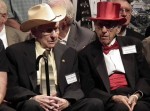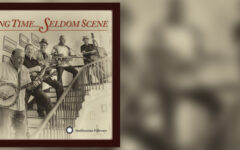
Tommy Scott, who worked to the self-applied motif as America’s Last Real Medicine Show, passed away on Monday, September 30 of complications following injuries sustained in an automobile accident on August 10. He was 96 years old.
Born in Stephens County, in the Blue Ridge foothills of Georgia, on June 24, 1917, Scott was taught to play the guitar by a neighbor. He began playing at church socials, dances and on local radio – WAIM, in nearby Anderson, South Carolina – with his sister Cleo at the age of 16. This led to his first job, working for ‘Doc’ M.F. Chamberlain’s Medicine Show, and so began a life as a traveling showman that lasted six decades.
After two years of touring the South, Chamberlain passed all interest in his show over to Scott; these included the medicine formulas for the laxative Herb-O-Lac, also called Man-O-Ree and Katona, and a liniment that Scott sold as Snake Oil.
He was a member of various medicine shows working on radio stations in Greensboro, Greenville and Raleigh, wherein during 1938 he had a position on WPTF radio.
The following year he was hired as a member of Charlie Monroe’s Kentucky Pardners, appearing as Rambling Scotty on Wheeling’s WWVA.
Another band member was John R ‘Curly’ Seckler, who would become a partner and life-long friend. The duo worked on WRDW Augusta, Georgia, and WSPA Spartanburg, South Carolina, sponsored by Vim-Herb Tonic, where they were known as Ramblin’ Scotty and Smilin’ Bill.
A freak snowstorm destroyed their tent show and the duo split (although they would reunite for recordings). Scott went back to playing the medicine shows.
 Later he spent a year at WSM Nashville and he worked on the Grand Ole Opry. He crafted a ventriloquist dummy that he named Luke McLuke and incorporated into his show along with some blackface comedy.
Later he spent a year at WSM Nashville and he worked on the Grand Ole Opry. He crafted a ventriloquist dummy that he named Luke McLuke and incorporated into his show along with some blackface comedy.
For the next decade Tommy Scott toured extensively, typically using various radio stations as a base, and employing his wife, Frankie, and daughter Sandra. At the same time he acquired a long-time band member in Gaines Blevins and Blevins’ son Scotty Lee.
In 1946 Scott filmed over 50 quarter-hour television shows, the Ramblin’ Tommy Scott Show, putting him ahead of his time in this respect. The cast included Sally Ann Forrester, Ray Aldridge, and Jimmy and Jenny Vance, and the show featured singing, dancing, and classic country comedy.
He also appeared in a western film, Trail of the Hawk, and made a few movie shorts. Later he appeared in Mountain Capers, Hillbilly Harmony, Southern Hayride.
Scott recorded for several labels, including Bullet, 4 Star, Macy’s, Rich-R-Tone, his own Katona label and, predominantly, King Records. Although he didn’t have any hits, the recordings stand as good examples of mainstream country music of the late 1940s and 1950s.
 Scott composed his most popular song of the late 1940s, Rosebuds and You, in honor of his long-time stage and film and TV co-star Frankie. The song became a regional hit in the south and west in 1950; it was later covered by dozens of artists including Country Music Hall of Famer George Morgan, the Willis Brothers, and Red Sovine. The late fiddler Benny Martin had a version of Rosebuds and You that reached Billboard’s Top 20 in 1963.
Scott composed his most popular song of the late 1940s, Rosebuds and You, in honor of his long-time stage and film and TV co-star Frankie. The song became a regional hit in the south and west in 1950; it was later covered by dozens of artists including Country Music Hall of Famer George Morgan, the Willis Brothers, and Red Sovine. The late fiddler Benny Martin had a version of Rosebuds and You that reached Billboard’s Top 20 in 1963.
Scott also wrote the minor bluegrass classic, You Are the Rainbow of My Dreams (as recorded by Charlie Bailey and Lester Flatt), and contributed to the multi-million selling pop song, Mule Train, to which he sold his rights. You Took My Sunshine, You Can’t Stop Time, Gonna Paint the Town Red, Tennessee, Rockin’ and Rollin’, Elly Mae and Pollution are among the more than 500 songs that he penned.
He returned to television in the 1950s with Tommy Scott’s Smokey Mountain Jamboree, running in syndication around the country with appearances by Grand Ole Opry stars Curley Williams and the John Daniel Quartet. Their portion of the show is the earliest historical film footage featuring a southern gospel quartet.
Among his other early television appearances was one with young talk show host Johnny Carson, and he later appeared with almost every major journalist, talk or variety show personality in the US and Canada, including Walter Cronkite, Oprah Winfrey, Ralph Emery, and David Letterman. He made multiple appearances for Entertainment Tonight, The Tommy Hunter Show, and The Today Show.
As live radio work almost vanished, Scott increased the amount of time that he spent on the road. Often he would exceed 350 days, traveling all over the US and Canada. To broaden the appeal of his show he would, at various times, add old-time movie heroes, such as Tim McCoy, Johnnie Mack Brown, and Sunset Carson, to his entourage. At other times Scott employed Bill and Wilma Millsaps, and Clyde Moody, another friend from the early days.
 By the late 1970s he began to emphasize the medicine show element and, although ‘Doc’ Scott’s Last Real Old Time Medicine Show became a parody of the original format, he gained some recognition as a cultural preservationist. Patrons bought the specially bottled “snake oil” as souvenirs.
By the late 1970s he began to emphasize the medicine show element and, although ‘Doc’ Scott’s Last Real Old Time Medicine Show became a parody of the original format, he gained some recognition as a cultural preservationist. Patrons bought the specially bottled “snake oil” as souvenirs.
It was at this time that Scott, wearing his trademark colorful clothes, red top hat, and snake skinned shoes, endeared himself to millions of fans around the world.
In more recent years he reduced the number of shows from 300 to 150 by the mid-1990s.
He continued to make records, getting together with Moody and Seckler for this purpose.
Interest in his early recordings prompted Cattle Records to re-issue three albums, and Old Homestead released one featuring radio shows from 1941 that featured Seckler.
Scott is the subject of two documentaries for PBS; one in 1980 focused on his performance career in the 1960s and 1970s, and the other, Still Ramblin’, in 2001, highlighted his early years in film and country music.
Curly Seckler remembers his friend ………………….
 “Tommy was a good fellow and a good showman. I first met him in 1939 when we both worked for Charlie Monroe at WWVA in Wheeling, West Virginia. We got together again in 1941 in Anderson, South Carolina.
“Tommy was a good fellow and a good showman. I first met him in 1939 when we both worked for Charlie Monroe at WWVA in Wheeling, West Virginia. We got together again in 1941 in Anderson, South Carolina.
We have stayed close friends ever since, through good times and bad. I will miss him.”
Scott was honored by the Country Music Association Walkway of Stars in 1976 and, in 2011, as an International Bluegrass Music Museum Legend. He is a member of the Atlanta Country Music Hall of Fame and was the subject of a major exhibition at the Georgia Music Hall of Fame from 1996-2008.
‘Doc’ Tommy Scott was laid to rest on October 4, 2013, in his home town Toccoa, Georgia.







